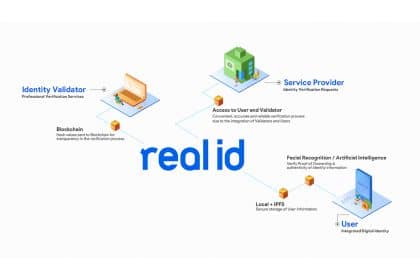Asia’s Digital ID Technology Developments Gain Pace

The recent spate of data breaches – ranging from a flaw in Google+ that led to its shutdown and the reported hacking and collection of 120 million Facebook users’ data for sale – have highlighted the potential for abuse of digital identity.
The digital world thrives on speed and trust. When trust is broken, the cost to businesses and individuals extends beyond loss of sales or income. Reputational damage, legal costs and the potential loss of future opportunities are critical concerns. While a universal digital identity may bring convenience, the challenge is to ensure that individuals have full ownership, control and protection of their identities.
Chong Han Ping, the CEO of Singapore-based start-up Real ID, whose partners include Alibaba-backed SenseTime, sais:
“Although developments in the sector have been brisk in the U.S. and Europe, technologies to safeguard digital identities have been slow to emerge in Asia due primarily to the diverse language mix and cross-racial facial features of the populations across the region.”
China-based SenseTime is a leader in facial recognition technology. Besides partnering with leading companies in the field, Real ID has also hired AI and machine-learning experts and data scientists formerly from tech giant Tencent, the China National Research Centre and Singapore’s Nanyang Technological University.
Language-Learning Technology
Chong Han Ping also says:
“Multi-language verification is rare, and we have focused our efforts on building local partnerships in different markets to improve our language-learning technology as well as to shorten machine-reading time. With these partnerships, we have been able to improve our database and document templates, which support multi-racial facial and image recognition.”
Real ID is in talks with authorities in India, Thailand, the Philippines and Indonesia as part of its strategy to build a regional digital ID ecosystem. A robust digital ID ecosystem will contribute towards frictionless cross-border business. For instance, the company’s screening and face-learning technology will help shorten the onboarding and KYC (Know-Your-Client) process for remittance transactions by as much as 90%. Also, machine-learning technology for the verification of documents reduces human error.
The Three Dimensions of Digital ID
Chong explains:
“There are three dimensions to the problems inherent in digital identity ownership and control, which are identity authentication, blockchain empowerment and the construction of an ecological platform.”
- Identity Authentification – Real ID’s identity authentication feature ensures that a digital ID is only given after verification of proof of ownership and authenticity of identity. The App serves as a self-identification tool equipped with SenseTime’s facial recognition technology. It allows you to create your own digital identity and verify it using a selfie. The digital identity can also be stored on your phone for future use. The App is empowered by liveness detection, face matching and machine learning to eliminate any deception.
- Blockchain Empowerment – the use of blockchain technology to record transactions across several computers ensures that records cannot be altered retroactively without the consensus of the network. The combination of both on-chain and off-chain transactions also allows identity verification results to be audited by different parties, without any need to reveal the underlying identity information. Real ID’s digital infrastructure is built with support from Tencent on Tencent Cloud and Tencent Blockchain system.
- Ecological Platform – users are at the core of Real ID, and its design gives them sole ownership over the creation and management of their identity information on a single platform. However, for their data to be adequately supported or accepted, it is necessary for the data to be backed by validators who have authority to issue a trust statement on behalf of the user. The user can choose the type of identity information they submit, for example, a passport, national ID card, academic certificates or income statements. Each piece of data will then act as a critical enabler for identity transaction in the Real ID platform.
Chong adds:
“Solving the problem of digital identity ownership and control requires creating the next generation of identity authentication standards.The advantage of Real ID is that it has invented a unified model for creating, collecting, verifying, accepting and authorising digital identities. “It is a full suite of products from identity verification, address verification to screening. Many of our competitors may only offer two out of the three. With this unified model, Real ID hopes to build a self-regulating ecosystem that connects users, merchants and certification bodies.”
According to Zion Market Research, the global identity and access management market, which includes advanced authentication, single sign-on and audit, was valued USD 7.85 billion in 2016. It is expected to reach around USD 15.92 billion by 2022, growing at a compound annual growth rate (CAGR) of 12.5% for the forecast period from 2017 to 2022. A more recent report by Technovio estimated that the market is growing at 13% during the period 2018-2022. This undoubtedly reflects the enormous value of personal digital identity.
Real ID projects that its
Disclaimer: This publication is sponsored. Coinspeaker does not endorse or assume responsibility for the content, accuracy, quality, advertising, products, or other materials on this web page. Readers are advised to conduct their own research before engaging with any company mentioned. Please note that the featured information is not intended as, and shall not be understood or construed as legal, tax, investment, financial, or other advice. Nothing contained on this web page constitutes a solicitation, recommendation, endorsement, or offer by Coinspeaker or any third party service provider to buy or sell any cryptoassets or other financial instruments. Crypto assets are a high-risk investment. You should consider whether you understand the possibility of losing money due to leverage. None of the material should be considered as investment advice. Coinspeaker shall not be held liable, directly or indirectly, for any damages or losses arising from the use or reliance on any content, goods, or services featured on this web page.